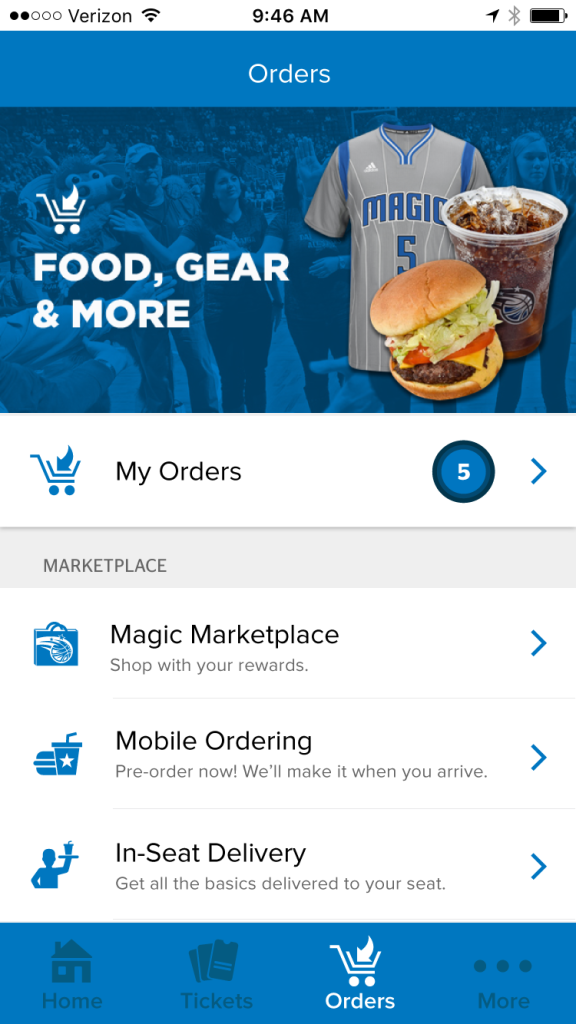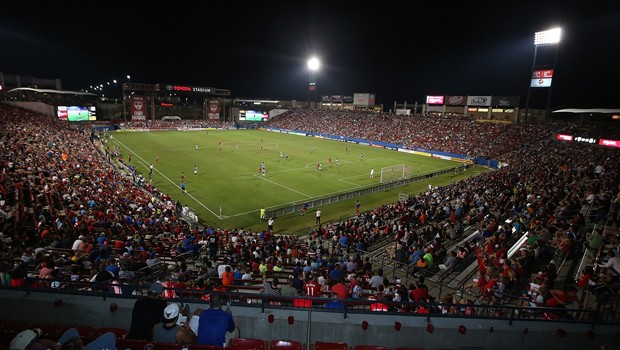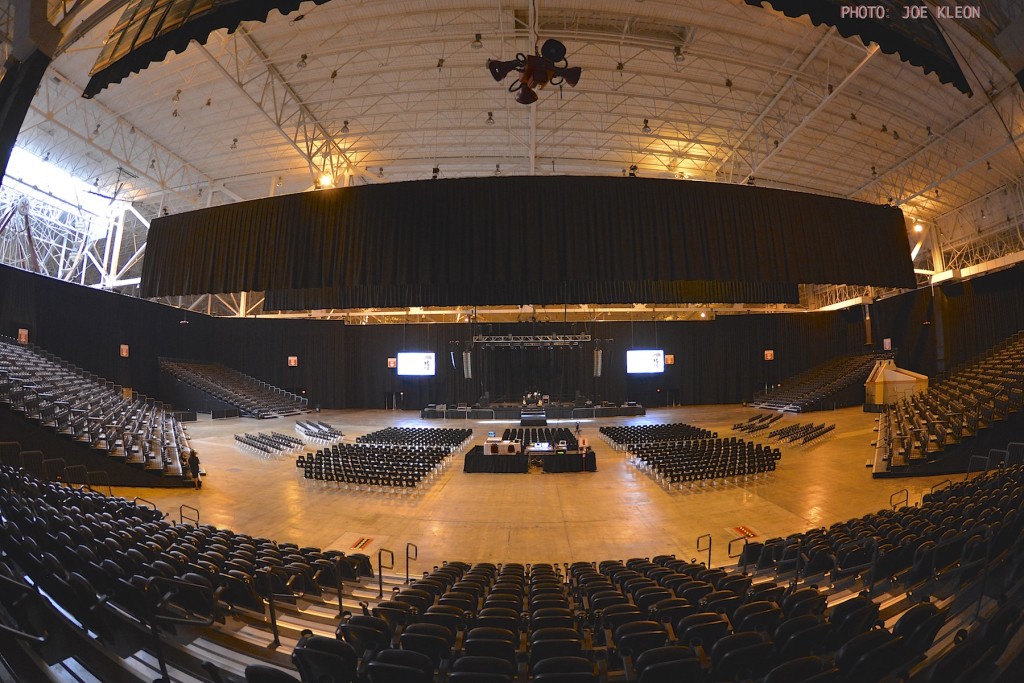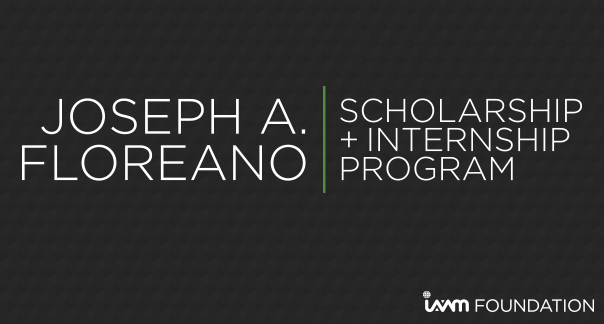Upgrades to Toyota Stadium Approved
The Frisco, Texas, city council and school board has approved a $39 million upgrade for Toyota Stadium, home to FC Dallas. That approval also brings the National Soccer Hall of Fame Museum, which will be part of a newly constructed second level of the stadium.
“Other improvements to the 10-year-old stadium are designed to better accommodate the NCAA Football Championship Subdivision title game, which will be in Frisco in January for the sixth year,” Valerie Wigglesworth reported for The Dallas Morning News. “Those upgrades include two 100-person locker rooms, more restrooms, more concession stands, a team store, a suite-level expansion, and better audiovisual technology. Crews will also build two access tunnels from the locker rooms to the field level.”
Toyota Stadium currently seats 20,500 guests and regularly plays hosts to concerts in addition to sporting events. It attracted more than two million visitors to Frisco in 2014.
The National Soccer Hall of Fame Museum houses more than 80,000 artifacts and records, including the world’s oldest soccer ball.
A press conference is set for October 14 to present more details.
(Image: FC Dallas)
Video: Social Value of a Sports Franchise
TED talks are simply the best, and here we have one from Jason Wexler at TEDxMemphis. Wexler is the president of business operations for the Memphis Grizzlies and the FedEx Forum. In the video, he talks about how a team helps generate social connectivity and how you can measure the social value of that connectivity. The talk is 11 minutes and well worth your time.
The I-X Center Installs Live Performance Space
The International Exposition (I-X) Center in Cleveland, Ohio, designed and installed a flexible, live performance space that includes sound walls, telescopic seating, and custom seating. It can go from a 3,500-seat theater to a 7,000-capacity arena, for example.
“Previously, our barriers attracting major concert promoters and national touring acts included a lack of elevated seating and the sound quality in this industrial complex,” said Jeremy Levine, I-X Center vice president of business development and creative force behind this project, in a statement. “We now offer a state-of the art performance space with remarkable flexibility and world-class sound. The acoustical environment has already blown away expectations and will only get better as we tweak the room.”
The new performance space is a 300-feet by 400-feet enclosed area with acoustic drapery and mass loaded sound panels. A vertical drape “canopy” flows above the audience at different heights for sound management. Also, an expanded flat-floor festival plan in the I-X Center can accommodate more than 23,000 guests in a single room.
“I-X Center’s new transitional arena/theater is a wonderful addition to the facility that already hosts large trade and consumer shows, as well as our growing portfolio of self-produced events,” Levine said. “We’re extremely excited with the capability to add live concerts, family shows, theatrical productions, and corporate events to our calendar, while I-X Center continues to serve as an economic and entertainment engine for Northeast Ohio.”
The center is working with VC Strategic Partners, a division of Venue Coalition, to develop content and introduce the venue to the live performance industry.
“We’re excited to be working with the I-X Center in Cleveland to introduce the market to this new performance space,” said Jeff Apregan, president of Venue Coalition, in a statement. “This new venue will offer multiple venue configurations and can host intimate reserved seat shows for 3,000 to 5,500 with general admission capacities that are much greater. Imagine an indoor music festival for 23,000! Best of all, when you step off your plane at the airport next door, you are only five minutes away from the backstage area.”
(Image: Joe Kleon)
2016 Scholarship + Internship Applications are Now Open
The Joseph A. Floreano Scholarship + Internship program is now accepting applications for all 2016 events. Scholarships + Internships will be awarded for the Academy for Venue Safety & Security, the Performing Arts Managers Conference, Venue Management School, VenueConnect, the Arena Management Conference, and the International Convention Center Conference.
“Applying for the VMS internship is the best decision I’ve ever made,” said Miah Moore, a student at Missouri State University student and a 2015 Venue Management School intern. “I want to encourage any students reading this to apply. Take the time and apply for all of the opportunities, because I promise you that you WILL take something away from your experience. You won’t regret it.”
The Joseph A. Floreano Scholarship + Internship Program was established after the untimely passing of Joseph A. Floreano, CFE, a long-time IAVM member, Foundation Trustee, and the first and only Honorary Chairman of the Foundation Board of Trustees. Floreano was known for giving selflessly in both time and money to worthy industry causes. His leadership was aspirational, and he took great pride in mentoring and supporting the advancement of the venue management industry. The contributions Floreano made to the Foundation are immeasurable and with that we believed that the naming of the scholarship + internship program would be the most appropriate way to honor his legacy that will forever leave a mark on the Foundation.
“I am extremely grateful for the opportunity given to me by the IAVM Foundation,” said Kenneth Gaudinez, an event manager at the Orange County Convention Center and a 2015 Venue Management School (VMS) Scholarship Recipient. “I never thought I would attend VMS until the Joseph A. Floreano Scholarship + Internship program was created. The IAVM Foundation is providing opportunities to those who may not have the resources to attend IAVM’s conferences, schools, or professional development courses. I encourage everyone to take full advantage of these opportunities and apply for the various scholarships they have to offer.”
Thirty-seven Scholarships + Internships were awarded in 2015 thanks to the support of committed donors. Recipients receive full complimentary registration to the respective conference or school in addition to a stipend to assist with travel expenses or hotel accommodations. For more information about the Joseph A. Floreano Scholarship + Internship program, click here. If you have any questions about the program, please contact IAVM Foundation staff at Foundation@iavm.org.
“Having the privilege to be part of VenueConnect as an intern was extremely rewarding, and I can’t thank IAVM enough for the opportunity,” said Ashley Molina, a University of Florida student and 2015 VenueConnect intern. “Not only is EVERYONE approachable, but they are also willing to share insight on the industry… I made valuable connections at VC15, especially with the interns. We clicked so well we felt like family by the end. I can’t wait to attend the next conference and be reunited with these wonderful people.”
Orlando Magic and Amway Center Partner With VenueNext
 The Orlando Magic announced today that the organization will implement the VenueNext technology platform into the Amway Center, starting with the 2015-2016 seasons. Guests will experience a new version of the Magic’s mobile app with services that include mobile tickets, wayfinding, and the ability to order food and drinks from their seats.
The Orlando Magic announced today that the organization will implement the VenueNext technology platform into the Amway Center, starting with the 2015-2016 seasons. Guests will experience a new version of the Magic’s mobile app with services that include mobile tickets, wayfinding, and the ability to order food and drinks from their seats.
“In continuing the Orlando Magic’s commitment to our fans and their experiences at Amway Center, we are thrilled to partner with VenueNext,” said Magic CEO Alex Martins in a statement. “VenueNext’s revolutionary innovation will give our fans the ability to be mobile-enabled for Magic games in the Amway Center. In essence, we are turning our patrons’ mobile devices into remote controls for the live experience. We are proud to be the first team in the NBA to launch this application in the fall, as we continue to make our patrons’ experience legendary.”
The Magic became the first NBA team to offer Apple Pay in December 2014. The organization also installed iBeacons throughout the venue, and was the first NBA team to sign a deal with FanDuel.com.
“The Orlando Magic is one of the most innovative, forward-thinking and fan-focused in the NBA,” said VenueNext CEO and Founder John Paul in a statement. “We’re excited to collaborate with this team, not only to improve the fan experience, but also to bring new insights to the Magic about the fans attending the technology-enhanced Amway Center.”
(Image: VenueNext)
Do you want to receive a Front Row News weekly digest?
Categories
- Allied (856)
- Architecture (147)
- Arenas (744)
- Career (890)
- Convention Centers (889)
- Education (608)
- Events (1,528)
- Food & Beverage (193)
- Foundation (113)
- Guest Experience (1,482)
- Industry News (2,253)
- Leadership (1,872)
- Marketing (150)
- Membership (1,985)
- Music (212)
- Performing Arts Centers (453)
- Professional Development (398)
- Research (127)
- Safety & Security (425)
- Sports (763)
- Stadiums (607)
- Student (159)
- Technology (515)
- Ticketing (92)
- Touring (82)
- Trends (357)
- Uncategorized (771)
- Universities (216)
- Video (25)
- Young Professional (198)
Twitter Feed
- Twitter feed loading
Recent Posts
- GEODIS Park Selects Allied Universal As Its Preferred Event Services Provider
- Venuworks Appoints Marc Solis as Executive Director of the Fresno Convention and Entertainment Center
- Los Angeles Convention Center Diverts 8,000 Pounds of Wood Waste to Local Foundation Supporting Fire Victims
- Fort Worth Unveils Plans for Phase 2 of Convention Center Transformation
- San Diego Convention Center CEO Announces Retirement After a Decade of Leadership
Categories
- Allied
- Architecture
- Arenas
- Career
- Convention Centers
- Education
- Events
- Food & Beverage
- Foundation
- Guest Experience
- Industry News
- Leadership
- Marketing
- Membership
- Music
- Performing Arts Centers
- Professional Development
- Research
- Safety & Security
- Sports
- Stadiums
- Student
- Technology
- Ticketing
- Touring
- Trends
- Uncategorized
- Universities
- Video
- Young Professional
Archives
- February 2026
- January 2026
- December 2025
- November 2025
- October 2025
- September 2025
- August 2025
- July 2025
- June 2025
- May 2025
- April 2025
- March 2025
- February 2025
- January 2025
- December 2024
- November 2024
- October 2024
- September 2024
- August 2024
- July 2024
- June 2024
- May 2024
- April 2024
- March 2024
- February 2024
- January 2024
- December 2023
- November 2023
- October 2023
- September 2023
- August 2023
- July 2023
- June 2023
- May 2023
- April 2023
- March 2023
- February 2023
- January 2023
- December 2022
- November 2022
- October 2022
- September 2022
- August 2022
- July 2022
- June 2022
- May 2022
- April 2022
- March 2022
- February 2022
- January 2022
- December 2021
- November 2021
- October 2021
- September 2021
- August 2021
- July 2021
- June 2021
- May 2021
- April 2021
- March 2021
- February 2021
- January 2021
- December 2020
- November 2020
- October 2020
- September 2020
- August 2020
- July 2020
- June 2020
- May 2020
- April 2020
- March 2020
- February 2020
- January 2020
- December 2019
- November 2019
- October 2019
- September 2019
- August 2019
- July 2019
- June 2019
- May 2019
- April 2019
- March 2019
- February 2019
- January 2019
- December 2018
- November 2018
- October 2018
- September 2018
- August 2018
- July 2018
- June 2018
- May 2018
- April 2018
- March 2018
- February 2018
- January 2018
- December 2017
- November 2017
- October 2017
- September 2017
- August 2017
- July 2017
- June 2017
- May 2017
- April 2017
- March 2017
- February 2017
- January 2017
- December 2016
- November 2016
- October 2016
- September 2016
- August 2016
- July 2016
- June 2016
- May 2016
- April 2016
- March 2016
- February 2016
- January 2016
- December 2015
- November 2015
- October 2015
- September 2015
- August 2015
- July 2015
- June 2015
- May 2015
- April 2015
- March 2015
- February 2015
- January 2015
- December 2014
- November 2014
- October 2014
- September 2014
- August 2014
- July 2014
- June 2014
- May 2014
- April 2014
- March 2014
- February 2014
- January 2014
- December 2013
- November 2013
- October 2013
- September 2013
- August 2013
- July 2013
- June 2013
- May 2013
- April 2013
- March 2013
- February 2013
- January 2013
- May 2012
- March 2012
- December 2011
- November 2011
- October 2011
Recent Comments
- Frank Bradshaw, Ph.D., CVE on John Meyer, CVE, a Tireless Advocate of Certification for Venue Professionals, Has Died
- Neil Sulkes on Hilary Hartung, Friend to Many in Venue Marketing, Has Left Us
- Jason Parker, CVE on The Devastation of Hurricane Helene and How We Can Support One Another
- Larry Perkins on Touhey Testifies Against Speculative Ticketing Before Congressional Subcommittee
- Peter Secord on Major Players for Planned Elkhart Amphitheater Were in the Mix at VenueConnect



